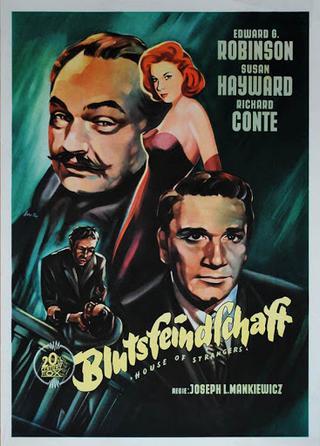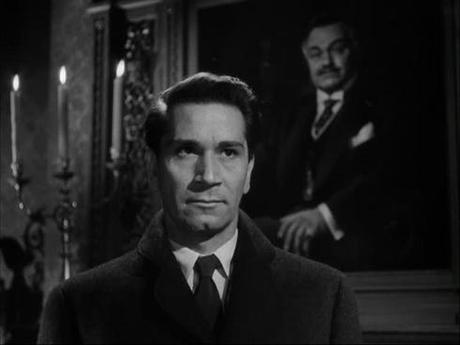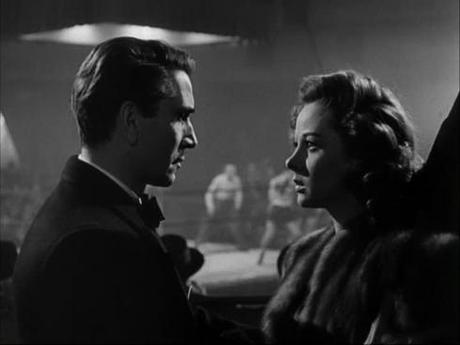
Back in 2015 I looked at , a superior western and a remake of an earlier movie. I remarked at the time that I preferred the later version of the story and that's still the case. Nevertheless, House of Strangers (1949), the original adaptation of Jerome Weidman's novel, is an excellent piece of work when viewed in its own right. All versions and adaptations of stories bring something different to the table: the sensibilities of the filmmakers involved, themes added or removed, highlighted or suppressed. Where Broken Lance broadened and extended the scope of the material, House of Strangers retains a tighter focus overall.
A crowded sidewalk, bustling and bursting with life, and amid it all the eye is drawn to one solitary figure making his way through the vibrant mass, a detached and determined figure. He pauses before the imposing facade of a bank, the guard inside eyeing him fishily through the polished plate glass. This is Max Monetti (Richard Conte), once a sharp and arrogant lawyer but now just another ex-con. Actually, he's a bit more than that; the bank was once the domain of his late father Gino Monetti (Edward G Robinson) before it was taken over by three of his sons, and before Max spent seven years as a guest of the state for jury tampering. Some of the brashness is still there though, and it's enough to worry his siblings. It's here that the lengthy flashback which occupies most the running time kicks in, showing how a family turned upon itself and slowly disintegrated, how rivalry and dissatisfaction became the seeds of hatred, how an old woman's heart was broken and how a once grand home was transformed into a mausoleum to pernicious pride.

As in the image above, the past is forever peering over the shoulders of the characters. And it's not just the malign spirit of Gino Monetti haunting his sons and poisoning their hearts, for even the old man in life was haunted by the specter of penury and subservience. The whole movie concerns itself with characters racing to keep a step ahead of their past, be it the stifling "old world" traditions that Gino professes to be desperate to throw off while apparently reveling in their trappings or another generation's desire to be free of the too firm hold of an overcritical patriarch. Underpinning all of this is the concept of revenge or retribution, and the corrosive effect it has for all who drink from that particular cup.
I opened by speaking of a narrower focus, and I feel House of Strangers actively seeks to present a sense of restrictiveness. Instead of showing family as a symbol of fertility, it offers up a view of a stagnant and suffocating household, and I think it's no coincidence that much of the action is rooted in the Monetti house and the old bank. Both structures have an old-fashioned ambience, a workplace where the sons are kept firmly in place - literally caged in the case of the elder brother Joe (Luther Adler) - and with limited options, and a home that is almost overpowering in the sheer weight and oppressiveness of its decor. The contrast with the light, spacious and airy apartment of Irene Bennett (Susan Hayward), the one person in the movie with an outward-looking perspective, and the one who represents the chance for a clean break with the past and new start on the west coast, is marked and unmistakable.

Susan Hayward's presence adds much to this movie. Her drive, allure, and most of all her infectious self-confidence represent the best hope of salvation for Richard Conte's Max. The frank and witty dialogue those two trade is a highlight, giving an edge to their passion and, in Conte's case, allowing his character to become much more rounded. Joseph L Mankiewicz, who apparently had an uncredited hand in the writing alongside Philip Yordan, was noted for the use of sophisticated dialogue and it's a real boon in this picture. The visuals and themes are well handled and well realized, but the smartness of the script gives everything extra vigor.
Richard Conte could always be relied on when you needed someone tough and streetwise, and he starts out incredibly sure of himself, unpleasantly so in fact. It's largely through his interaction with Hayward though that he unbends gradually, looking out instead of in, realizing what to embrace and what to reject. Edward G Robinson plays a man it's hard to like - even in his more expansive and beneficent moods there's a shade of self-importance about him. As the story progresses, this latter quality develops, eventually running to bitterness and, ultimately, spite and vindictiveness. With a trio such as Robinson, Hayward and Conte headlining, there's not a lot of space left for others to make their mark. That said, Luther Adler is subtly impressive, enduring the pettiness and humiliations as he broods and nurtures a deep resentment. In support Paul Valentine and Efrem Zimbalist Jr are the other two browbeaten offspring, while the imposing Hope Emerson seems an unlikely mother to the diminutive Debra Paget.
House of Strangers was released on DVD years ago as part of the Fox Film Noir line and the image is pleasing if not perfect, with a few trailers and a commentary track by Foster Hirsch as supplements. All told, this is the kind of highly polished picture one would expect from 20th Century Fox and Joseph L Mankiewicz. The shift to a western setting allowed Broken Lance to successfully explore other ideas and make it a more satisfying experience. However, I like to examine every movie on its own merits and I feel House of Strangers deserves to be praised for what it is rather than disparaged for what it isn't.
